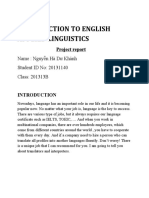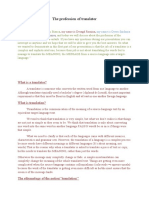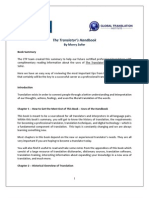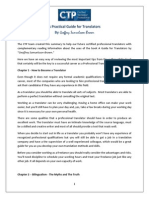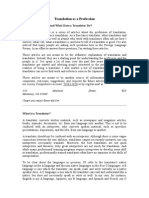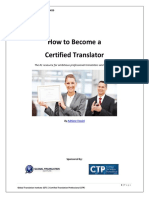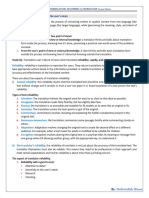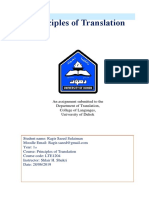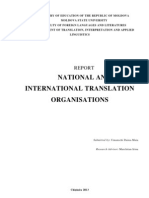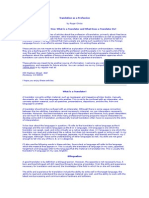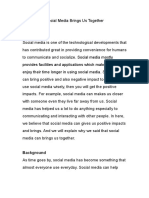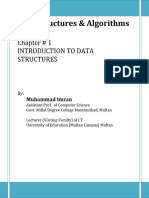1 How to become a translator
They know enough who know how to learn
Henry Adams, 1836–1918
People usually become translators in one of two ways: by design or by circumstance.
There are no formal academic qualifications required to work as a translator, but adver-
tisements for translators in the press and professional journals tend to ask for graduates
with professional qualifications and three years’ experience.
Many countries have professional organisations for translators and if the organisation
is a member of the Fédération Internationale des Traducteurs (FIT) it will have demon-
strated that it sets specific standards and levels of academic achievement for member-
ship. The translation associations affiliated to FIT can be found on FIT’s website – www.
fit-ift.org. Two organisations in the United Kingdom set examinations for professional
membership. These are the Chartered Institute of Linguists (CIoL) and the Institute of
Translation and Interpreting (ITI). To gain a recognised professional qualification
through membership of these associations you must meet certain criteria. Comprehensive
details of professional associations for translators in the United Kingdom are given in
Chapter 11.
If you have completed your basic education and have followed a course of study to
become a translator, you will then need to gain experience. As a translator, you will
invariably be asked to translate every imaginable subject. The difficulty is accepting the
fact that you have limitations and you are faced with the dilemma of ‘How do I gain
experience if I don’t accept translations or do I accept translations to get the experi-
ence?’. Ideally as a fledgling translator you should work under the guidance of a more
experienced colleague.
Do not disregard your dossier of translations made while studying at university. You
will have covered a range of subjects and received feedback from your tutor. You will be
unlikely to receive this level of analytical constructive criticism from an agency or client.
If you have progressed to studying for an MA you will have reached a very professional
level. Continuous personal development with a professional body such as the ITI or the
CIoL will stand you in very good stead.
1
�A PRACTICAL GUIDE FOR TRANSLATORS
1.1 ‘Oh, so you’re a translator – that’s interesting!’
An opening gambit at a social or business gathering is for the person next to you to ask
what you do. When the person finds out your profession the inevitable response is, ‘Oh
so you’re a translator – that’s interesting’ and, before you have a chance to say anything,
the next rejoinder is, ‘I suppose you translate things like books and letters into foreign
languages, do you?’. Without giving you a chance to utter a further word you are hit by
the fatal catch-all, ‘Still, computers will be taking over soon, won’t they?’. When faced
with such a verbal attack you hardly have the inclination to respond.
The skills clusters that the translator needs at his fingertips are shown in Figure 1.
Regrettably, an overwhelming number of people – and these include clients – harbour
many misconceptions of what is required to be a skilled translator. Such misconceptions
include the following:
• As a translator you can translate all subjects.
• If you speak a foreign language ipso facto, you can automatically translate into it.
• If you can hold a conversation in a foreign language, then you are bilingual.
Cultural Information
understanding technology
What influences the Hardware and software
development of the used in producing
source language translations
National characteristics Electronic file
where the language is management
spoken E-commerce
Hazards of stereotyping
Project Making
management decisions
Resources coordination
Translation Consulting
Terminology research
Administration
skills Reflecting
Analysing and
evaluating
Quality control
Establishing facts
Making judgements
Language and Communication
literacy Clarity of expression
Establishing rapport
Understanding of the
source language Giving and processing
feedback
Writing skills in the
target language Listening and questioning
Proof-reading and Observing and checking
editing understanding
Figure 1. Translation skills clusters
2
� HOW TO BECOME A TRANSLATOR
• Translators are mind-readers and can produce a perfect translation without having to
consult the author of the original text, irrespective of whether it is ambiguous, vague
or badly written.
• No matter how many versions of the original were made before final copy was
approved or how long the process took, the translator needs only one stab at the task,
and very little time, since he gets it right first time without the need for checking or
proofreading. After all, the computer does all that for you.
1.2 A day in the life of a translator
Each day is different since a translator, particularly a freelance, needs to deal with a
number of tasks and there is no typical day. I usually get up at around 7 in the morning,
shower, have breakfast and get to my desk at around 8 just as my wife is leaving to drive
to her office. Like most freelances I have my office at home.
I work in spells of 50 minutes and take a break even if it is just to walk around the house.
I try and take at least half an hour for lunch and try to finish at around 5 unless there is
urgent work and then I will perhaps work in the evening for an hour or so. But I do the latter
only if a premium payment is offered and I wish to accept the work. If I were to analyse an
average working month of 22 possible working days, I would get the following:
My average monthly output for these fifteen and a half effective days is around
28,000 words. If this is spread out over effective working days of six working
hours (8 ¥ 50 minutes in reality), my effective hourly production rate is 300 words an
hour. This may not seem a lot but it may be worth considering that to expect to work
undisturbed on translation eight hours a day, five days a week, is unrealistic. There may
Task or item to which time is accounted Time spent on the task
Translation including project management, research, draft translation, Fifteen and a half days
proofreading and editing, resolving queries and administration
Office administration including invoicing, purchasing and correspondence Two days
(tax issues and book-keeping are dealt with by my accountant)
External activities such as networking and marketing One day
Continuous personal development including – and this is not a joke – One day
watching relevant TV programmes or reading articles on subjects in which
you have or wish to improve your expertise.
Public or other holidays (say 21 days leave and 7 days public holidays) Two and a half days
